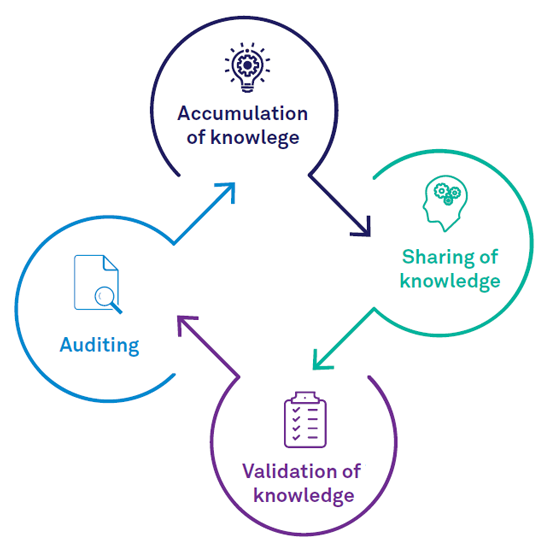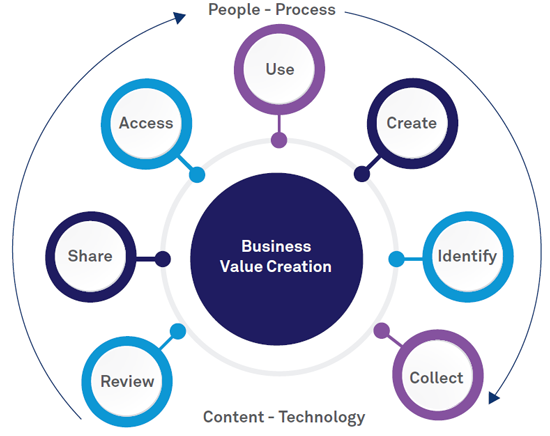July | 2021
One of the most important and valuable assets of any organization is the knowledge it has accumulated over the years. It is very important to handle that knowledge in a systematic way to reap its benefits.
In any organization, the sources of knowledge are its employees or/and customers. A continuous cycle ensures the knowledge being accumulated is valuable for the organization. This cycle, as depicted in Figure 1, starts with the creation of knowledge by various stakeholders, which is then shared with the larger group for validation and a proper structure for easy reference. The knowledge is continuously audited to keep it meaningful.

Figure 1: Knowledge lifecycle
A learning culture is essential in an organization and sharing of knowledge is important to ensure this culture. Any person who is willing to learn should have easy access to knowledge. Not all types of knowledge are easy to share: creativity or design thinking can’t be shared but the thinking process behind a specific idea can be shared to help people understand how to think on a similar line or think differently. Some types of knowledge are easy to materialize and share as it contains specific steps like a mathematical equation.
Knowledge Management ensures that the knowledge remains within the organization and helps improve efficiency through sharing of best practices and learnings.
Why is knowledge management important?
Often, most of the knowledge in an organization is undocumented and not accessible. Visibility of information can help employees take well-informed decisions that will directly benefit the organization. Different apps and data structures are used across the organization to store information, which may not be easily understood by other teams to reap its benefits.
Not all of us are good teachers; when it comes to transferring knowledge to our peers, we fail to transfer all the information because we are ourselves unaware of things that we have learnt and have become core to our thinking and decision-making. Due to this, employees spend time recreating all the knowledge that already exists in an organization but have been lost. Same mistakes are made repeatedly, and the organization falls in a cycle of inefficiency that hinders growth and productivity.
An intelligent organization fosters innovation within the organization that benefits their employees and customers by harvesting the knowledge gathered during the organization’s lifetime. In today’s highly competitive environment, it is very important to be as agile as possible and quickly respond to new situations using expertise and intelligence that the organization has gathered over the past.
Organizations often realize the importance of Knowledge management solutions when they merge with another organization and require to share their experience and information for realizing mutual benefits. Even when a key personnel moves out of an organization, management often realizes the need for a solution to store and share information to avoid dependency on any individual.
Knowledge management helps organizations create an efficient workplace where all employees’ knowledge is valued. Collaboration between employees also improves when they share knowledge and it is easier to understand someone’s perspective when the information behind that thought is readily available. All these benefits directly link towards efficient and better decision making in an organization along with improved employee retention.
Knowledge management in the digital age
Digital transformation is changing the entire operating model of organizations. With advancement in technology, employees need to be prepared for more competitiveness as organizations will start rewarding employees based on their ability to perform tasks which machines are not able to do. Previous experience and qualifications of workers would get less weightage. Today’s employees are being shortlisted based on their capability to collaborate with machines having cognitive functions. This makes knowledge management even more meaningful as we become dependent on cognitive machines for highly repetitive and complex work.

Figure 2: Business value creation at each step of knowledge management
Knowledge management will help create an optimized workflow, which would enhance our productivity and identify innovative opportunities. Systematic coordination among people, process and technology is essential. Figure 2 shows how knowledge, whether it is sharing, creating, or identifying, is helping in the creation of business value along with the people, process and technology. Knowledge management will realize the real value and potential of business through knowledge reuse.
With digital transformation, organizations are collecting infinite data points using sensors and then transmitting it to cloud systems for processing. These advancements towards big data are making knowledge management much more relevant as this knowledge is being utilized for development across the value chain, including intelligent process automation.
Knowledge management is no longer limited to information, it has diversified into data and insights, which are the key drivers of analytics.
How knowledge management fits every Industry
Knowledge management benefits most industries through several process improvements. We will quickly discuss some use cases pertaining to different Industries.
Knowledge management is moving toward semantic web
The vision of semantic web states that the all the information available on the web should be easily understood by machines so that they can derive valuable insights even without human interventions. Knowledge management is complementing this vision by bringing this to reality in an organization’s perspective.
If we look at the larger perspective, the technology that we need to fuel semantic web needs development and investment. This development can only be successful when organizations have a reason and value to invest in it. In future, the leaders will look forward to democratizing the technology and then, semantic web would be a reality.
Vartul Mittal
Vartul Mittal is a technology and innovation specialist focused on helping clients accelerate their digital transformation journeys. He has 14+ years of experience in global business transformation as a consultant for management and global in-house centers. He has also managed technology and business teams in areas like intelligent automation, advanced analytics, and cloud adoption. He is passionate about extending customer relationships beyond the project level to transform enterprise operations and increase business value.
Shrinkhal Gupta
Shrinkhal Gupta leads transformation go-to-market activities for iCORE, Wipro, with a special focus on virtual and industry events. He also leads growth marketing activities and demand-generation initiatives for automation and new-age SaaS platforms and solutions.